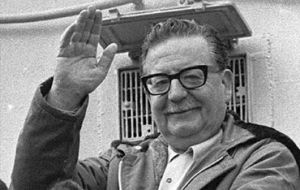MercoPress. South Atlantic News Agency
Chile exhumes Allende’s remains to end a long standing controversy
 Salvador Allende, Chile’s first Socialist president who was deposed by a military uprising in September 1973
Salvador Allende, Chile’s first Socialist president who was deposed by a military uprising in September 1973 Investigators in Chile exhumed Salvador Allende’s remains on Monday as part of an inquiry into the former president’s death in a military coup 37 years ago. Allende died during a September 1973 military attack against the presidential palace that led to 17 years of dictatorial rule.
The Allende family requested the exhumation as part of a judicial probe into whether the Socialist Party leader was killed or committed suicide during the coup.
The investigation has the support of opposing political coalitions, making it a symbol of Chile’s democratic maturity, said Mauricio Morales, a political scientist at Diego Portales University in Santiago. No such consensus existed immediately following the end of the dictatorship in the early 1990s and a formal probe at that time would certainly have aggravated rifts between political parties and the military just as Chile’s nascent democracy was taking root, he said.
“These investigations don’t polarize Chile’s political elite like they would have in the early nineties,” Morales said. “That exemplifies the consolidation of Chile’s democracy.”
After the dictatorship led by Augusto Pinochet ended in 1990 with the presidency of Patricio Aylwin, Chileans were reluctant to delve into the past because coup participants were still politically active and ran the military, said Patricio Navia, a specialist in Chilean politics at New York University.
Two decades later, most of those directly involved in the dictatorship have faded from political life. President Sebastian Piñera’s government, which last year ousted the coalition that had governed the country since Pinochet left office, has vowed to support the Allende investigation to distance itself from memories of the dictatorship, Navia said.
“People previously didn’t want to look into the past too carefully because it would destabilize the emerging democracy,” Navia said. “Now that democracy is very stable and the past is gone; history can come in and do its job. This investigation will serve more of a historical purpose than anything else.”
Based on witness’ accounts and government findings, most historians agree that Allende chose to commit suicide during the coup rather than surrender to military forces.
Allende’s family also believes the president took his own life, one of his daughters, Senator Isabel Allende told the dozens of reporters and photographers who covered Monday’s event at the national cemetery.
“Our conviction is that President Allende decided to die in an act of political solidarity to defend the mandate given to him by the people,” said the Socialist Party senator.
For Dr. Luis Ravanal, a forensic expert, the 1973 autopsy report suggests Allende was shot in the head with two guns. That may mean he didn’t act alone in committing suicide or his death was a homicide, Ravanal said in a May 19 interview.
Ravanal is submitting a report on his findings to the judiciary.




Top Comments
Disclaimer & comment rules-

-

Read all commentsWho was Nadia ?
May 24th, 2011 - 11:18 am 0Navia?
May 24th, 2011 - 01:25 pm 0Commenting for this story is now closed.
If you have a Facebook account, become a fan and comment on our Facebook Page!